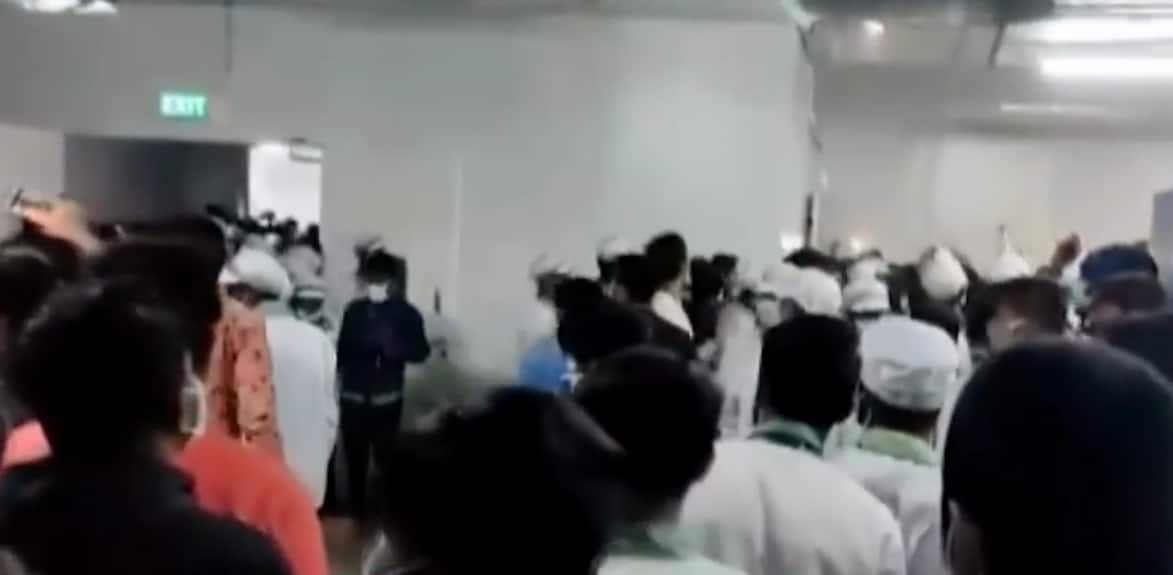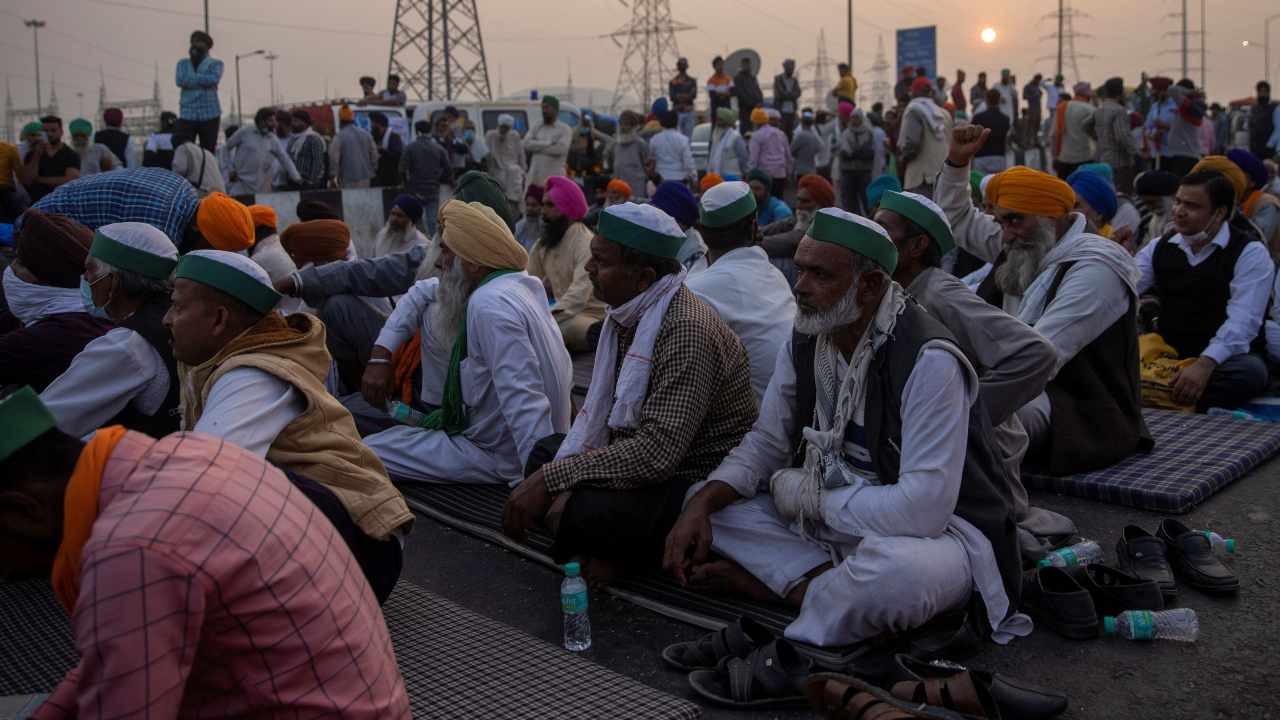Close to 1,500 people were involved in the violence on December 12 at the iPhone manufacturing facility of Wistron Corporation in Naraspura, Karnataka.
December 12 began like any other day at the iPhone contract manufacturing facility of Wistron Corporation in Naraspura, Karnataka. However, just at the time when the night-shift workers had to exit for the day, panic spread. Workers (and allegedly external people) started breaking furniture, CCTV cameras and glass equipment. Cars in the parking lot were damaged too and equipment was also set on fire. Faces were covered with masks and nobody could point out who was responsible.
But when Moneycontrol spoke to workers and labour unions, it reflected a fault line running deep especially at manufacturing units employing contractual workers.
At Taiwan’s Wistron which makes Apple’s iPhone, this was the first such recorded violent incident in its Karnataka facility. The company has said that it has suffered losses of close to Rs 440 crore with several products being stolen. This facility was set up two years ago and is located about 70 kilometres away from Bengaluru.
“Individuals barged in from all entry gates. We didn’t even understand who these people were. They started shouting slogans seeking salary payments. But this didn’t look spontaneous, and we had been hearing murmurs of discontent for the past 3-4 months,” said a Wistron contract worker who did not want to be identified.
As per the official CCTV footage, close to 1,500 people were involved in the violence on December 12. Karnataka police have arrested 156 people for inciting violence and vandalising property. The labour commissioner also met the third-party contractual agencies on December 14 to investigate any salary delays.
 Vandalised property at Wistron's iPhone manufacturing facility in Narasapura, Karnataka
Vandalised property at Wistron's iPhone manufacturing facility in Narasapura, Karnataka
But the question being asked is what led to the sudden violence at the facility, and if there was a violation of labour laws.
This incident holds relevance in India especially at a time when the Prime Minister Narendra Modi-led government is looking to attract foreign brands to make in India.
The incident and repercussions
On December 12, the Naraspura industrial region in Kolar district, Karnataka saw unprecedented violence allegedly caused by delay in salary payments.
Citing job security and payment delays, thousands of workers stormed into Wistron’s manufacturing facility and completely vandalised the premises. Chairs were broken, glass shards were scattered everywhere, and even physical structures were torn down.
The cause of the incident is said to be workers discontent against Wistron management and the latter allegedly refusing to resolve these complaints.
 Workers assemble amidst violence at Wistron plant in Karnataka
Workers assemble amidst violence at Wistron plant in Karnataka
“Some payment delays have happened and this causes a lot of financial stress to us. There were also talks of workers planning to protest, but we didn’t realise this would get violent,” said another contractual worker.
He added that a few others who joined early this year were also promised higher salaries of upto Rs 22,000, but were paid only Rs 14,000-15,000. This worker also said the COVID-19 pandemic had been used as an excuse to cut the pay despite work remaining the same. Moneycontrol could not independently verify these claims.
An email sent to Wistron did not elicit any response. Reports said Apple is investigating this incident and allegations of labour law violations. An email sent to Apple’s India team did not elicit any response either.
In a filing to the Taiwan Stock Exchange, Wistron Corporation said, “We are deeply shocked by the events at our Narasapura facility. We follow the law and are supporting the authorities with their investigation. The safety and wellbeing of our team members is always our top priority. We will collaborate with related parties to provide any help needed for the employees.”
Post the incident, the facility has been shut and in fact even nearby manufacturing units at Naraspura industrial area had downed shutters on Saturday due to fears of further violence. These facilities resumed activities from the next day amidst heavy police presence
What are the workers' issues?
Insiders said while Wistron employs about 14,000 people in its manufacturing facility, only 10 percent of these are on full-time payroll. The rest are contractual workers whose salaries are handled by third-party agencies who handle their contracts.
This is probably the biggest reason for discontent, for these contractual workers have alleged that they are alienated by the management.
One worker quoted above said while Wistron may not have been directly responsible for salary delays, they could have intervened and made the third-party agencies to pay them on time.
Karnataka state labour commissioner Akram Pasha told Moneycontrol that the delay in payment by the contractors was a one-off incident. He added that since it was a new facility, there was no formal unions or organised structure for these workers.
“In our meeting, we found out that the salary that was to be paid on the 7th of the month was instead paid on the 11th. Also, there was a software glitch because of which one to two days salary could not be remitted. If the workers had any concerns about their monthly pay, they could have contacted the labour department. However, no such complaints have been filed so far,” he added.
Pasha said Wistron will be resuming production activities as soon as the repair work is completed.
Are labour rights of contractual workers ignored?
It is not just the Wistron facility that is seeing worker discontent, but several other manufacturing outfits have seen worker protests. At the Toyota Kirloskar Motors plant in Bidadi, Karnataka, the worker strike has entered the 35th day. Here, the workers complained of being overworked.
Similarly, at garment manufacturer Gokuldas Exports there were protests in June 2020 over 1,300 workers being laid-off amidst the pandemic. The company had cited COVID-19 slowdown as the reason.
When it comes to Wistron, workers said the biggest issue was being under third-party agencies and often bearing the brunt of ‘hire and fire’ policies and payment delays.
MD Harigovind, General Secretary of All India Trade Union Congress (AITUC), Bengaluru, said the industrial violence in Wistron is a direct result of mismanagement and exploitation of workers in a manufacturing facility of the world’s most expensive mobile phone brand.
“Local workers are being made to work in unskilled categories and outsiders have been employed for other operator roles. The management was asked for a resolution, but no effort was made. This was spontaneous and workers were forced to agitate,” he added.
The state police is now looking into the shift-schedules of the company to ascertain the names of workers present at the facility during the time of violence. Initial investigations have pointed to involvement of outsiders.
Underlying treatment of contractual labour and lack of proper dialogue between the management and the workers is also to blame, say labour rights experts.
KR Shyam Sundar, Labour Economist and Professor at XLRI - Xavier School of Management, Jamshedpur, told Moneycontrol that the industrial relations policies adopted by companies tend to have a typical adversarial and cost-cutting approach. However, he pointed that companies manufacturing iPhones that have a predictable demand shouldn’t have such issues.
“Workers have become increasingly insecure because there are contractors and sub-contractors adopting precarious fluctuating job practices. Why should there be wage arrears by an MNC? It reflects that there is a lack of social dialogue between workers and management,” he added.
Would the local law changes be a factor?
The Karnataka government had in July 2020 decided to tweak rules to boost ease of doing business in the state. As part of these rules, there wouldn’t be surprise inspections at manufacturing units to check on any possible labour law violations.
A report said the government will soon give prior notices to companies before any such inspection at their facilities. This would mean that sudden inspections to check violation of laws including working hours, working conditions and minimum wages would be done away with.
Professor Shyam Sundar explained that ease of doing business cannot come at the cost of workers rights.
“Karnataka has liberalised labour inspections. If the inspection system was robust and intervention by the state was adequate along with proper dialogue between the workers and the management, this situation wouldn’t have escalated,” he added.












_2020091018165303jzv.jpg)






























